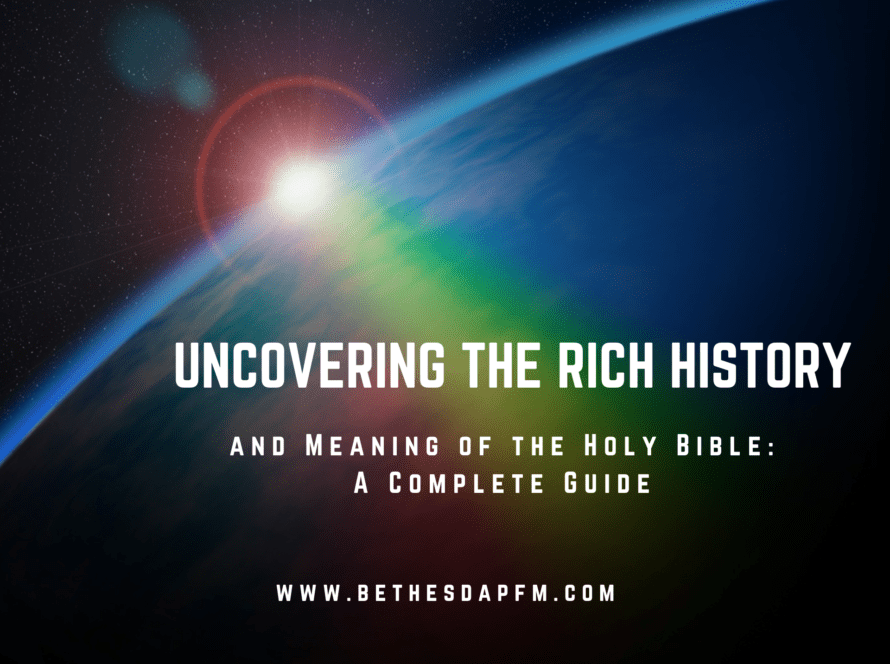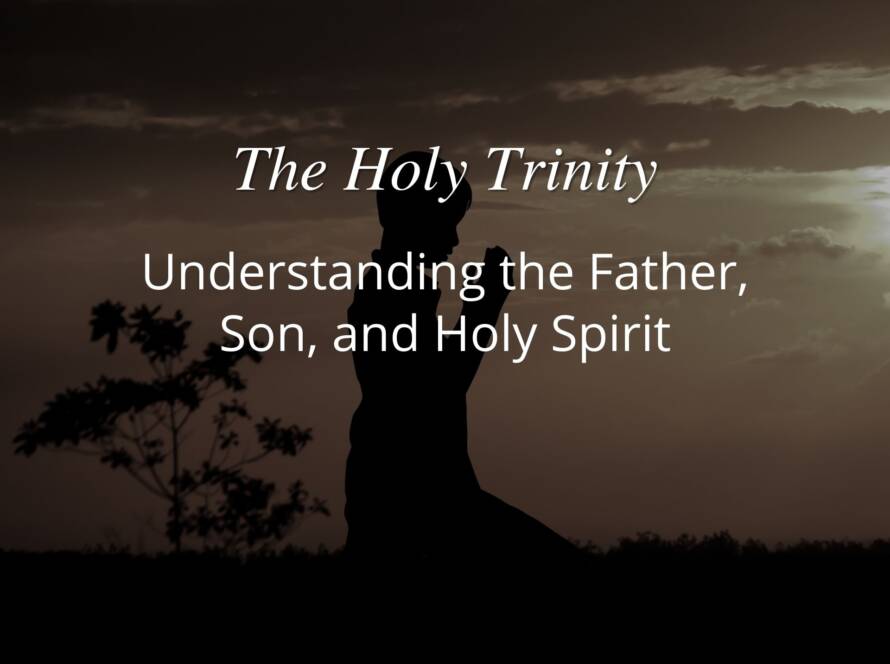The concept of the Holy Trinity is a fundamental belief in Christianity. It refers to the understanding that God exists as three distinct persons – the Father, Son, and Holy Spirit – while still being one God. This concept can be challenging to comprehend fully, as it goes beyond our human understanding of individuality and unity. However, it is crucial for Christians to grasp this concept as it forms the foundation of their faith.
Understanding the Trinity is essential because it shapes our understanding of who God is and how He relates to us. It reveals that God is not a solitary being but exists eternally in a loving relationship within Himself. The Father, Son, and Holy Spirit are distinct persons who are co-equal and co-eternal, yet they are united in perfect love and harmony. This understanding helps us recognize that God’s nature is relational at its core.
Key Takeaways
- The Holy Trinity is a fundamental belief in Christianity, representing the three persons of God: the Father, the Son, and the Holy Spirit.
- The Father is the creator and sustainer of the universe, while the Son is the redeemer and savior of humanity, and the Holy Spirit is the comforter and guide.
- The Trinity is both unified and diverse, with each person having a distinct role and personality.
- Belief in the Trinity has practical implications for how Christians live their lives and understand their relationship with God.
- While the Trinity is a mystery that cannot be fully understood, it is an essential aspect of Christian belief and tradition.
The Three Persons of the Trinity
The Father, Son, and Holy Spirit are three distinct persons within the Trinity who play different roles while remaining united in purpose.
The Father can be understood as the Creator and Sustainer of all things. He initiated creation out of His love for humanity and continues to sustain it by His providence. In Scripture, we see Him portrayed as a loving father figure who cares deeply for His children’s well-being.
The Son refers to Jesus Christ, who took on human form through His incarnation on earth. He fulfilled various roles within salvation history: Redeemer by offering Himself as a sacrifice for humanity’s sins; Savior by conquering death through His resurrection; Teacher by imparting divine wisdom; Mediator between humanity and God; King over all creation.
The Holy Spirit represents God’s presence with believers today after Jesus’ ascension into heaven. The Spirit comforts us during times of distress or sorrow while guiding us towards truth and righteousness. In Scripture, we see Him depicted as a dove descending upon Jesus during His baptism, symbolizing the Spirit’s role in empowering and equipping believers.
The Father: Creator and Sustainer
The Father’s role within the Trinity is that of the Creator and Sustainer. In the book of Genesis, we read about how God spoke creation into existence, bringing order out of chaos. He formed everything with intentionality and purpose, displaying His wisdom and power.
Throughout the Bible, we see glimpses of God’s fatherly love for humanity. He cares for His creation deeply, providing for their needs and guiding them towards righteousness. Just as a loving father protects his children from harm, so does God watch over us with tender care.
The Son: Redeemer and Savior
| Metrics | The Son: Redeemer and Savior |
|---|---|
| Number of Chapters | 14 |
| Number of Verses | 303 |
| Author | Unknown |
| Genre | Gospel |
| Language | Greek |
| Theme | The life, teachings, death, and resurrection of Jesus Christ as the Son of God and the Savior of the world |
| Key Verses | “For God so loved the world that he gave his one and only Son, that whoever believes in him shall not perish but have eternal life.” – John 3:16 |
| Significance | The Son: Redeemer and Savior is one of the four Gospels in the New Testament and provides a unique perspective on the life and teachings of Jesus Christ. It emphasizes the divinity of Jesus and his role as the Savior of the world, and is a key source of Christian theology and doctrine. |
The Son’s role within the Trinity is that of Redeemer and Savior. Jesus Christ willingly took on human form to reconcile humanity with God by offering Himself as a sacrifice for our sins on the cross.
In Scripture, we see Jesus portrayed as both fully human and fully divine – a unique union known as the hypostatic union. Through His death on the cross, He paid the price for our sins, offering forgiveness to all who believe in Him.
Furthermore, Jesus’ resurrection demonstrated His victory over sin and death. By conquering death through His resurrection, He offers eternal life to those who put their faith in Him.
The Holy Spirit: Comforter and Guide
The Holy Spirit plays an essential role within the Trinity as Comforter and Guide to believers today after Jesus’ ascension into heaven.
In John 14:16-17 (NIV), Jesus promised to send another Advocate or Helper – referring to the Holy Spirit – who would be with believers forever:
“And I will ask the Father,
and he will give you another advocate
to help you
and be with you forever—
the Spirit of truth.”
The Holy Spirit comforts us during times of distress, providing solace and peace that surpasses human understanding. Additionally, the Spirit guides us towards truth and righteousness, convicting us of sin and empowering us to live according to God’s will.
The Unity and Diversity of the Trinity
The Holy Trinity is a unique concept that combines both unity and diversity. It teaches that there is one God who exists eternally in three distinct persons – Father, Son, and Holy Spirit.
While this concept may seem paradoxical or even contradictory from a human perspective, it reveals the depth of God’s nature. The Trinity demonstrates that unity does not mean uniformity; rather, it encompasses diversity within perfect harmony.
Understanding the unity and diversity of the Trinity is crucial because it helps us recognize that relationships are at the core of our existence as humans. We are created in God’s image, designed for relationship with Him and with others. Just as the Father, Son, and Holy Spirit exist in perfect love and unity while maintaining their distinct roles within the Trinity, we are called to live in harmony with one another while embracing our unique identities.
The Importance of the Trinity in Christian Belief
The belief in the Holy Trinity is central to Christian faith because it shapes our understanding of who God is and how He relates to humanity.
Firstly, recognizing God as a triune being emphasizes His relational nature. It reveals that love has always existed within His very essence – before creation itself – which provides a foundation for understanding why love should be central to our lives as well.
Secondly, belief in the Trinity affects Christian worship practices by emphasizing communal worship rather than individualistic spirituality alone. Christians gather together as a community to worship God collectively because they believe He exists eternally within loving relationship Himself.
Thirdly, understanding each person’s role within the Trinity helps believers relate more intimately with each member individually: approaching God as Father when seeking guidance or provision; turning to Jesus as Savior and Redeemer when seeking forgiveness or salvation; relying on the Holy Spirit for comfort, guidance, and empowerment.
Common Misconceptions about the Trinity
Despite its importance in Christian belief, the concept of the Trinity is often misunderstood or misrepresented. Some common misconceptions include:
1. Tritheism: This misconception suggests that Christians believe in three separate gods rather than one God who exists as three persons. However, this contradicts the fundamental belief in monotheism – that there is only one true God.
2. Modalism: Modalism suggests that God manifests Himself in different modes or forms at different times but is not truly three distinct persons simultaneously. This view denies the distinctiveness of each person within the Trinity.
3. Subordinationism: This misconception implies that one person within the Trinity is subordinate to another, suggesting a hierarchy among them. However, orthodox Christianity teaches that all three persons are co-equal and co-eternal.
It is important to clarify these misconceptions because they can lead to misunderstandings about Christian belief and hinder our ability to grasp the true nature of God as revealed through Scripture.
The Trinity in Scripture and Tradition
The concept of the Holy Trinity finds support both in Scripture and tradition within Christianity.
In Scripture, we find numerous references to all three persons of the Trinity:
– In Matthew 28:19 (NIV), Jesus commands His disciples to baptize new believers “in
the name of
the Father
and of
the Son
and of
the Holy Spirit.” This verse highlights all three persons’ involvement during baptism.
– In John 14-16 (NIV), Jesus speaks extensively about His relationship with both Father and Spirit,
highlighting their unity while emphasizing their distinct roles.
– Throughout Paul’s letters, he frequently refers to all three members of the Trinity,
underscoring their significance within Christian faith.
Tradition also plays a role in supporting the belief in the Trinity. Early church fathers, such as Athanasius and Augustine, wrote extensively about the Trinity, defending its orthodoxy against various heresies that arose during their time.
Practical Implications of Believing in the Trinity
Belief in the Holy Trinity has practical implications for daily life and relationships.
Firstly, recognizing God’s relational nature encourages believers to prioritize relationships with others. Just as God exists eternally within loving relationship Himself, we are called to love one another sacrificially and unconditionally.
Secondly, understanding each person’s role within the Trinity helps believers relate more intimately with each member individually. This allows for a deeper connection with God as Father when seeking guidance or provision; a greater appreciation of Jesus’ sacrifice as Savior and Redeemer when seeking forgiveness or salvation; a reliance on the Holy Spirit for comfort, guidance, and empowerment.
Thirdly, belief in the Trinity reminds us that our faith is not solely an individualistic pursuit but rather a communal one. We are called to gather together as a community of believers to worship God collectively and support one another on our spiritual journeys.
Embracing the Mystery of the Holy Trinity
In conclusion, understanding and embracing the concept of the Holy Trinity is essential for Christians because it shapes their understanding of who God is and how He relates to humanity. The Father represents creation and sustenance; The Son embodies redemption and salvation; The Holy Spirit provides comfort and guidance.
While this concept may be challenging to fully comprehend due to its paradoxical nature from a human perspective, it reveals profound truths about God’s relational nature within Himself – unity amidst diversity – which has practical implications for daily life.
As we continue on our journey of faith, let us embrace this mystery while remaining open-hearted towards learning more about who God is through His revelation in Scripture. May we seek deeper intimacy with each person within the Trinity, recognizing their distinct roles and appreciating the unity they share.
FAQs
What is the Holy Trinity?
The Holy Trinity is the Christian doctrine that describes God as three distinct but inseparable persons: the Father, the Son (Jesus Christ), and the Holy Spirit.
How is the Holy Trinity different from other monotheistic religions?
The Holy Trinity is a unique concept in Christianity and is not found in other monotheistic religions such as Judaism and Islam, which believe in one God without any division or distinction.
What is the role of each person in the Holy Trinity?
The Father is the creator and sustainer of the universe, the Son is the savior of humanity who died on the cross for our sins, and the Holy Spirit is the comforter and guide who empowers believers to live a holy life.
How can three persons be one God?
The Holy Trinity is a mystery that cannot be fully understood by human reason. It is a doctrine that is based on the revelation of God in the Bible and has been affirmed by the church throughout history.
Why is the Holy Trinity important for Christians?
The Holy Trinity is the foundation of Christian faith and worship. It reveals the nature of God as a loving and relational God who desires to be in a personal relationship with his creation. It also provides a framework for understanding the work of God in salvation and the Christian life.
Thank you for reading! Share your experiences and questions in the comments below!



